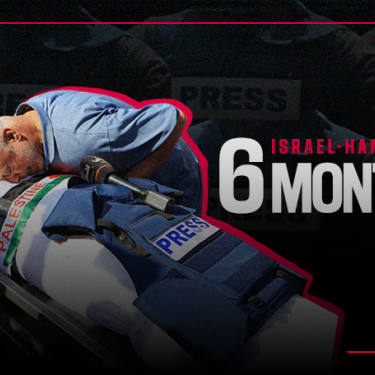More than 100 journalists killed in six months in Gaza – where is the international community?

Reporters Without Borders (RSF) reiterates its call to the international community to protect Palestinian journalism and step up pressure on Israel for an end to the massacre in Gaza, where more than 105 journalists have been killed since 7 October, including at least 22 killed in the course of their work. Gaza is still inaccessible and subject to constant bombardment but few journalists have been allowed to leave.
“Protection” is the emphatic response from Gazan journalists when asked by RSF what they most need in Gaza today. They have lived in constant terror since 7 October, counting the deaths of loved-ones and colleagues. According to RSF’s tally, at least 105 have so far been killed by Israeli airstrikes, rockets and gunfire, including at least 22 in the course of their work.
Despite repeated calls from NGOs, including RSF, for the Rafah border crossing to be opened, only journalists embedded with the Israel Defence Forces have been able to enter Gaza and they are restricted to covering Israeli permitted areas. Israel has meanwhile allowed only a handful of Gazan journalists to be evacuated.
“Six months of war are six months too many in which more than 100 journalists have been killed in Gaza. This massacre must stop. Gaza’s reporters must be protected, those who wish must be evacuated, and Gaza’s gates must be opened to international media. The few reporters who have been able to leave bear witness to the same terrifying reality of journalists being attacked, injured and killed. The Israel Defence Forces are silencing those who are driven by a duty to report the facts. RSF calls on the international community, its leaders and its governments, to do everything to step up pressure on the Israeli authorities to end this disaster. Palestinian journalism must be protected as a matter of urgency.
RSF has met with some of the evacuated journalists in the Qatari capital, Doha, including Al Jazeera’s iconic bureau chief Wael al-Dahdouh, Agence France-Presse (AFP) photojournalist Mahmoud al-Hams, RSF correspondent Ola al-Zaanoon, and her son, freelance reporter Moussa al-Zaanoon.
They describe the risks they ran to keep reporting the news as Gaza continued to be completely closed. “We felt it was up to us to provide the entire world with information,” RSF’s correspondent said. “A journalist was killed or wounded every day,” her 24-year-old son added. “I was in constant fear of losing my father, my mother and my own life, but I understood that it was my duty to report what was happening.”
These journalists, who were evacuated from Gaza in January and February, were in such constant fear of being targeted by Israeli strikes that other civilians were afraid to be near them, said AFP’s photojournalist Mahmoud Hams. “During the evacuation of Gaza City [in October], some people didn’t want me to be near them for fear that I would be targeted as a journalist,” Hams said. “Others refused to rent us houses to live, work and rest in because they had the unshakeable conviction that all journalists in Gaza were targets.”
